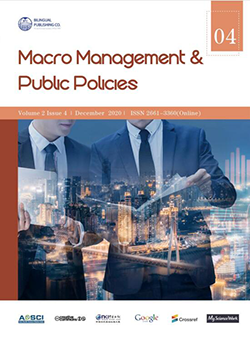-
1049
-
385
-
266
-
244
-
232
How the News Media Cover Environmental Issues in United Kingdom: A Comprehensive Study of Mexico Gulf Oil Spill Disaster in 2010
DOI:
https://doi.org/10.30564/mmpp.v2i4.2553Abstract
It is widely known that an increasing number of attentions have paid on environmental issues and meanwhile, the mass media promotes its role in helping define the concept and field of environment and also bringing environmental issues into social attention. This paper intends to investigate how news media in covering environmental issues in United Kingdom through the perspective of Mexico Gulf oil spill incident in 2010 particularly. In details, this study focuses more on the study of trends and patterns of news coverage on oil spill disaster during the research process. The sample is made up of two mainstream newspapers in UK (the Times and the Guardian) which are selected based on circulation figures and politically centre-based figures from April 2010 to April 2011. This study employs content analysis as its primary methodology to observe the trends and patterns of news coverage. In addition, this study not only discovers characteristics, trends and patterns of each newspaper but also uses comparative way to discover differences and similarities in order to investigate how national newspapers differ from each other when focusing on the same environmental news. Through the investigation step by step, this study answers the hypothesis and concludes that news media cover environmental issues in a particular ways as they adopt different trends and patterns in coverage while they still have some ways in common.
Keywords:
News media; Environmental issue; Mexico Gulf Oil Spill DisasterReferences
[1] Anderson, A. Media, Culture and the Environment. London: UCL Press, 1997.
[2] Anderson, A., Marhadour, A. Slick PR? The Media Politics of the Prestige oil spill. Science Commnication, 2007, 29(1), 96-115.
[3] Associated Press. Justice Department sues BP over gulf spill – Government says oil company, others ignored safety rules. San Jose Mercury News, 2010, 7A.
[4] Bakir, V. Journal of Risk Research, Taylor & Francis, 2005, 8(7-8), 679-691.
[5] Barcus, F. E. Communications content: analysis of the research. University of Illinois, 1959.
[6] Berelson, B. Content Analysis in Communication Research (Glencoe, Ill.: Free Press), 1952.
[7] British Business Survey. The Sunday Times, the Times, Times online, 2005. Available: http://www.thetimesme.com/obj/bbsf.pdf, 2011, July 01.
[8] Button, G. V. Catastrophe & Culture: The Anthropology of Disaster. Edited by Cox, R. Environmental Communication and the Public Sphere. London:Sage, 2002. Downs, A. (1972) Up and down with ecology-the “issue attention cycle”. Public Interest, 2006, 28, 38-50.
[9] Davison, W. Mass Media (2nd ed.). New York: Holt Rinehard & Winston, 1982. Dunwoody, S. The scientist as source. In S. Friedman, S. Dunwoody, C. Rogers (Eds.), Scientists and Journalists: Reporting Science as News, 1986, 3-16. New York: Free Press.
[10] Dunwoody, S., Griffin, R. Journalistic strategies for reporting long-term environmental issues: A case study of three Superfund sites. In A. Hansen 259 (Ed.), The Mass Media and Environmental Issues, 1993:22-50. New York: Leicester University Press.
[11] Gamson, W. A., A. Modigliani. Media discourse and public opinion on nuclear power: A constructionist approach. Am. J. Sociol. 1989, 95, 1-37.
[12] Hansen, A. Environment, Media and Communication. London: Routledge, 2010.
[13] Hansen, A. Claims-making and framing in British newspaper coverage of the ‘Brent Spar’ controversy. In Allan, S., Adam, B. and Carter, C. Environmental Risks and The Media. London: Routledge, 2000.
[14] Hansen, A., Cottle, S., Negrine, R., Newbold, C. Content analysis, in Mass Communication Research Methods. PALGRAVE MACMILLAN, 1998.
[15] Krippendorff, K. Content Analysis (2nd ed.). London: Sage. Layder, D. (1998) Sociological Practice: Linking Theory and Social Research. London: Sage, 2004.
[16] Lofstedt, R. E., Renn, O. The Brent Spar controversy: an example of risk communication gone wrong. Risk Analysis, 1997, 17(2), 131-135.
[17] McCombs, M., Shaw, D., Weaver, D. Communication & Democracy: Exploring the Intellectual Frontiers in a Agenda-Setting Theory. Mahwah, NJ: Lawrence Erlbaum, 1997.
[18] McCombs, M., Shaw, D. The agenda setting function of the mass media. Public Opinion Quarterly, 1972, 36, 176-187.
[19] Meckel, M., Volpe, J. D. A Spill and a Spin. How Traditional and Social Media are Interrelated in Covering the BP Oil Spill 2010. In Panel Submission 61st Annual Conference of the International Communication Association. Boston, 2011, 26-30.
[20] Molotch, H., Lester, M. Accidental News: The Great Oil Spill as Local Murdock, G., Petts, J. and Horlick-Jones, T. After amplification: rethinking the role of the media in risk communication, in N. Pidgeon, R. E. Kasperson and P. Slovic (eds) The Social Amplification of Risk, 2003, 1975:156-178. Cambridge: Cambridge University Press.
[21] Occurrence and National Event. American Journal of Sociology, 1975, 81(2):235-260. The University of Chicago Press.
[22] Pellechia, M. G. Trends in science coverage: A content analysis of three U.S. newspapers. Public Understanding of Science, 1997,6, 49-68.
[23] Pew Research Center. How the Media Cover the Oil Spill Disaster. Available, 2010. http://pewresearch.org/pubs/1707/media-coverage-analysis-gulf-oil-spill-disaster, 2011, June 29.
[24] Solosky, J. News reporting and professionalism: Some constraints of the reporting of the news. Media, Culture and Society, 1989, 11, 207-228.
[25] Widener, P., Gunter, V. J. Oil spill recovery in the media: Missing an Alaska native perspective. Society & Natural Resources, 2007, 20, 767-783.
Downloads
How to Cite
Issue
Article Type
License
Copyright © 2021 Author(s)

This is an open access article under the Creative Commons Attribution-NonCommercial 4.0 International (CC BY-NC 4.0) License.




 Ying Sun
Ying Sun

